- Home
- H. Beam Piper
A Planet for Texans (aka Lone Star Planet) Page 2
A Planet for Texans (aka Lone Star Planet) Read online
Page 2
Capella IV had been settled during the first wave of extra- solar colonization, after the Fourth World—or First Interplanetary-War. Some time around 2100. The setders had come from a place in North America called Texas, one of the old United States. They had a lengthy history—independent republic, admission to the United States, secession from the United States, reconquest by the United States, and general intransigence under the United States, the United Nations and the Solar League. When the laws of non-Einsteinian physics were discovered and the hyperspace-drive was developed, practically the entire population of Texas had taken to space to find a new home and independence from everybody.
They had found Capella IV, a Terra-type planet, with a slightly higher mean temperature, a lower mass and lower gravitational field, about one-quarter water and three-quarters land-surface, at a stage of evolutionary development approximately that of Terra during the late Pliocene. They also found supercow, a big mammal looking like the unsuccessful attempt of a hippopotamus to impersonate a dachshund and about the size of a nuclear-steam locomotive. On New Texas’ plains, there were billions of them; their meat was fit for the gods of Olympus. So New Texas had become the meat- supplier to the galaxy.
There was very little in any of the microfilm-books about the politics of New Texas and such as it was, it was very scornful. There were such expressions as ‘anarchy tempered by assassination,’ and ‘grotesque parody of democracy.’
There would, I assumed, be more exact information in the material which had been shoved into my hand just before boarding the cutter from Luna, in a package labeled TOP SECRET: TO BE OPENED ONLY IN SPACE, AFTER THE FIRST HYPERJUMP. There was also a big trunk that had been placed in my suite, sealed and bearing the same instructions.
I got Hoddy out of the suite as soon as the ship had passed out of the normal space-time continuum, locked the door of my cabin and opened the parcel.
It contained only two loose-leaf notebooks, both labeled with the Solar League and Department seals, both adorned with the customary bloodthirsty threats against the unauthorized and the indiscreet. They were numbered ONE and TWO.
ONE contained four pages. On the first, I read:
FINAL MESSAGE OF THE FIRST SOLAR LEAGUE AMBASSADOR TO NEW TEXAS ANDREW JACKSON HICKOCK
I agree with none of the so-called information about this planet on file with the State Department on Luna. The people of New Texas are certainly not uncouth barbarians. Their manners and customs, while lively and unconventional, are most charming. Their dress is graceful and practical, not grotesque; their soft speech is pleasing to the ear. Their flag is the original flag of the Republic of Texas; it is definitely not a barbaric travesty of our own emblem. And the underlying premises of their political system should, as far as possible, be incorporated into the organization of the Solar League. Here politics is an exciting and exacting game, in which only the true representative of all the people can survive.
DEPARTMENT ADDENDUM After five years on New Texas, Andrew Jackson Hickock resigned, married a daughter of a local rancher and became a naturalized citizen of that planet. He is still active in politics there, often in opposition to Solar League policies.
That didn’t sound like too bad an advertisement for the planet. I was even feeling cheerful when I turned to the next page, and:
FINAL MESSAGE OF THE SECOND SOLAR LEAGUE AMBASSADOR TO NEW TEXAS CYRIL GODWINSON Yes and no; perhaps and perhaps not; pardon me; I agree with everything you say. Yes and no; perhaps and perhaps not; pardon me; I agree . . .
DEPARTMENT ADDENDUM After seven years on New Texas, Ambassador God- winson was recalled; adjudged hopelessly insane.
And then:
FINAL MESSAGE OF THE THIRD SOLAR LEAGUE AMBASSADOR TO NEW TEXAS R. F. GULLIS
I find it very pleasant to inform you that when you are reading this, 1 will be dead.
DEPARTMENT ADDENDUM Committed suicide after six months on New Texas.
I turned to the last page cautiously, found:
FINAL MESSAGE OF THE FOURTH SOLAR LEAGUE AMBASSADOR TO NEW TEXAS
SILAS CUM SHAW
I came to this planet ten years ago as a man of pronounced and outspoken convictions. I have managed to keep myself alive here by becoming an inoffensive nonentity. If I continue in this course, it will be only at the cost of my self-respect. Beginning tonight, I am going to state and maintain positive opinions on the relation between this planet and the Solar League.
DEPARTMENT ADDENDUM Murdered at the home of Andrew J. Hickcock.
(see p. 1.)
And that was the end of the first notebook. Nice, cheerful reading; complete, solid briefing.
I was, frankly, almost afraid to open the second notebook. I hefted it cautiously at first, saw that it contained only about as many pages as the first and that those pages were sealed with a band around them.
I took a quick peek, read the words on the band:
Before reading, open the sealed trunk which has been included with your luggage.
So I laid aside the book and dragged out the sealed trunk, hesitated, then opened it.
Nothing shocked me more than to find the trunk . . . full of clothes.
There were four pairs of trousers, light blue, dark blue, gray and black, with wide cuffs at the bottoms. There were six or eight shirts, their colors running the entire spectrum in the most violent shades. There were a couple of vests. There were two pairs of short boots with high heels and fancy leather-working, and a couple of hats with four-inch brims.
And there was a wide leather belt, practically a leather corset.
I stared at the belt, wondering if I was really seeing what was in front of me.
Attached to the belt were a pair of pistols in right- and left-hand holsters. The pistols were seven-mm Krupp-Tatta Ultraspeed automatics, and the holsters were the spring- ejection, quick-draw holsters which were the secret of the State Department Special Services.
This must be a mistake, I thought. I’m an Ambassador now and Ambassadors never carry weapons.
The sanctity of an Ambassador’s person not only made the carrying of weapons unnecessary, so that an armed Ambassador was a contradiction of diplomatic terms, but it would be an outrageous insult to the nation to which he had been accredited.
Like taking a poison-taster to a friendly dinner.
Maybe I was supposed to give the belt and the holsters to Hoddy Ringo. . . .
So I tore the sealed band off the second notebook and read through it.
I was to wear the local costume on New Texas. That was something unusual; even in the Hooligan Diplomats, we leaned over backward in wearing Terran costume to distinguish ourselves from the people among whom we worked.
I was further advised to start wearing the high boots immediately, on shipboard, to accustom myself to the heels. These, I was informed, were traditional. They had served a useful purpose, in the early days on Terran Texas, when all travel had been on horseback. On horseless and mechanized New Texas, they were a useless but venerated part of the cultural heritage.
There were bits of advice about the hat, and the trousers, which for some obscure reason were known as Levis. And I was informed, as an order, that I was to wear the belt and the pistols at all times outside the Embassy itself.
That was all of the second notebook.
The two notebooks, plus my conversation with Ghopal, Klung and Natalenko, completed my briefing for my new post.
I slid off my shoes and pulled on a pair of boots. They fitted perfectly. Evidently I had been tapped for this job as soon as word of Silas Cumshaw’s death had reached Luna and there must have been some fantastic hurrying to get my outfit ready.
I didn’t like that any too well, and I liked the order to carry the pistols even less. Not that I had any objection to carrying weapons, per se: I had been born and raised on Theta Virgo IV, where the children aren’t allowed outside the house unattended until they’ve learned to shoot.
But I did have strenuous objections to being sent, vi
rtually ignorant of local customs, on a mission where I was ordered to commit deliberate provocation of the local government, immediately on the heels of my predecessor’s violent death.
The author of Probable Future Courses of Solar League Diplomacy had recommended the use of provocation to justify conquest. If the New Texans murdered two Solar League Ambassadors in a row, nobody would blame the League for moving in with a space-fleet and an army. . . .
I was beginning to understand how Doctor Guillotin must have felt while his neck was being shoved into his own invention.
I looked again at the notebooks, each marked in red: Familiarize yourself with contents and bum or disintegrate.
I’d have to do that, of course. There were a few nonhumans and a lot of non-League people aboard this ship. I couldn’t let any of them find out what we considered a full briefing for a new Ambassador.
So I wrapped them in the original package and went down to the lower passenger zone, where I found the ship’s third officer. I told him that I had some secret diplomatic matter to be destroyed and he took me to the engine room. I shoved the package into one of the mass-energy convertors and watched it resolve itself into its constituent protons, neutrons and electrons.
On the way back, I stopped in at the ship’s bar.
Hoddy Ringo was there, wrapped up in—and I use the words literally—a young lady from the Alderbaran system. She was on her way home from one of the quickie divorce courts on Terra and was celebrating her marital emancipation. They were so entangled with each other that they didn’t notice me. When they left the bar, I slipped after them until I saw them enter the lady’s stateroom. That, of course, would have Hoddy immobilized—better word, located—tor a while. So I went back to our suite, picked the lock of Hoddy’s room, and allowed myself half an hour to search his luggage.
All of his clothes were new, but there were not a great many of them. Evidently he was planning to re-outfit himself on New Texas. There were a few odds and ends, the kind any man with a real home planet will hold on to, in the luggage.
He had another eleven-mm pistol, made by Consolidated- Martian Metalworks, mate to the one he was carrying in a shoulder-holster, and a wide two-holster belt like the one furnished me, but quite old.
I greeted the sight and the meaning of the old holsters with joy: they weren’t the State Department Special Services type. That meant that Hoddy was just one of Natalenko’s run-of-the-gallows cutthroats, not important enough to be issued the secret equipment.
But I was a little worried over what I found hidden in the lining of one of his bags, a letter addressed to Space- Commander Lucius C. Stonehenge, Aggression Department Attache, New Austin Embassy. I didn’t have either the time or the equipment to open it. But, knowing our various Departments, I tried to reassure myself with the thought that it was only a letter-of-credence, with the real message to be delivered orally.
About the real message I had no doubts: arrange the murder of Ambassador Stephen Silk in such a way that it looks like another New Texan job. . . .
Starting that evening—or what passed for evening aboard a ship in hyperspace—Hoddy and I began a positively epochal binge together.
I had it figured this way: as long as we were on board ship, I was perfectly safe. On the ship, in fact, Hoddy would definitely have given his life to save mine. I’d have to be killed on New Texas to give Kliing’s boys their excuse for moving in.
And there was always the chance, with no chance too slender for me to ignore, that I might be able to get Hoddy drunk enough to talk, yet still be sober enough myself to remember what he said.
Exact times, details, faces, names, came to me through a sort of hazy blur as Hoddy and I drank something he called superbourbon—a New Texan drink that Bourbon County, Kentucky, would never have recognized. They had no corn on New Texas. This stuff was made out of something called superyams.
There were at least two things I got out of the binge. First, I learned to slug down the national drink without batting an eye. Second, I learned to control my expression as I uncovered the fact that everything on New Texas was super- something.
I was also cautious enough, before we really got started, to leave my belt and guns with the purser. I didn’t want Hoddy poking around those secret holsters. And I remember telling the captain to radio New Austin as soon as we came out of our last hyperspace-jump, then to send the ship’s doctor around to give me my hangover treatments.
But the one thing I wanted to remember, as the hangover shots brought me back to normal life, I found was the one thing I couldn’t remember. What was the name of that girl—a big, beautiful blond—who joined the party along with Hoddy’s grass widow from Alderbaran and stayed with it to the end?
Damn, I wished I could remember her namel
When we were fifteen thousand miles off-planet and the lighters from New Austin spaceport were reported on the way, I got into the skin-tight Levis, the cataclysmic-colored shirt, and the loose vest, tucked my big hat under my arm, and went to the purser’s office for my guns, buckling them on. When I got back to the suite, Hoddy had put on his pistols and was practicing quick draws in front of the mirror. He took one look at my armament and groaned.
“You’re gonna get yourself killed for sure, with that rig, an’ them popguns,” he told me.
"These popguns’ll shoot harder and make bigger holes than that pair of museum-pieces you’re carrying,” I replied.
“An’ them holsters!” Hoddy continued. “Why, it’d take all day to get your guns outa them! You better let me find you a real rig, when we get to New Austin. . . .”
There was a chance, of course, that he knew what I was using and wanted to hide his knowledge. I doubted that.
“Sure, you State Department guys always know everything,” he went on. “Like them microfilm-books you was readin’. I try to tell you what things is really like on New Texas, an’ you let it go in one ear an’ out the other.”
Then he wandered off to say good-bye to the grass widow from Alderbaran, leaving me to make the last-minute check on the luggage. I was hoping I’d be able to see that blond . . . what was her name; Gail something-or-other. Let’s see, she’d been at some Terran university, and she was on her way home to ... to New Texas! Of course!
I saw her, half an hour later, in the crowd around the airlock when the lighters came alongside, and I tried to push my way toward her. As I did, the airlock opened, the crowd surged toward it, and she was carried along. Then the airlock closed, after she had passed through and before I could get to it. That meant I’d have to wait for the second lighter.
So I made the best of it. and spent the next half-hour watching the disc of the planet grow into a huge ball that filled the lower half of the viewscreen and then lose its curvature, and instead of moving in toward the planet, we were going down toward it.
CHAPTER III
New Austin spaceport was a huge place, a good fifty miles outside the city. As we decended, I could see that it was laid out like a wheel, with the landings and the blast-off stands around the hub, and high buildings—packing houses and refrigeration plants—along the many spokes. It showed a technological level quite out of keeping with the accounts I had read, or the stories Hoddy had told, about the simple ranch life of the planet. Might be foreign capital invested there, and I made a mental note to find out whose.
On the other hand, Old Texas, on Terra, had been heavily industrialized; so much so that the state itself could handle the gigantic project of building enough spaceships to move almost the whole population into space.
Then the landing-field was rushing up at us, with the nearer ends of the roadways and streets drawing close and the far ends lengthening out away from us. The other lighter was already down, and I could see a crowd around it.
There was a crowd waiting for us when we got out and went down the escalators to the ground, and as I had expected, a special group of men waiting for me. They were headed by a tall, slender individual in the short black
Eisenhower jacket, gray-striped trousers and black homburg that was the uniform of the Diplomatic Service, alias the Cookie Pushers.
Over their heads, at the other rocket-boat, I could see the gold-gleaming head of the girl I’d met on the ship.
I tried to push through the crowd and get to her. As I did, the Cookie Pusher got in my way.
"Mr. Silk! Mr. Ambassador! Here we are!” he was clamoring. “The car for the Embassy is right over here!” He clutched my elbow. “You have no idea how glad we all are to see you, Mr. Ambassador!”
“Yes, yes; of course. Now, there’s somebody over there I have to see, at once.” I tried to pull myself loose from his grasp.
Across the concrete between the two lighters, I could see the girl push out of the crowd around her and wave a hand to me. I tried to yell to her; but just then another lighter, loaded with freight, started to lift out at another nearby stand, with the roar of half a dozen Niagaras. The thin man in the striped trousers added to the uproar by shouting into my ear and pulling at me.
“We haven’t time!” he finally managed to make himself heard. “We’re dreadfully late now, sirl You must come with us.”
Hoddy, too, had caught hold of me by the other arm.
“Come on, boss. There’s gotta be some reason why he’s got himself in an uproar about whatever it is. You’ll see her again.”
Then, the whole gang—Hoddy, the thin man with the black homburg, his younger accomplice in identical garb, and the chauffeur—all closed in on me and pushed me, pulled me, half-carried me, fifty yards across the concrete to where their aircar was parked. By this time, the tall blond had gotten clear of the mob around her and was waving frantically at me. I tried to wave back, but I was literally crammed into the car and flung down on the seat. At the same time, the chauffeur was jumping in, extending the car’s wings, jetting up.
“Great God!” I bellowed. “This is the damnedest piece of impudence I’ve ever had to suffer from any subordinates in my whole State Department experience! I want an explanation out of you, and it’d better be a good one!”

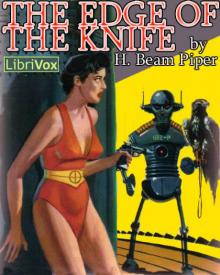 The Edge of the Knife
The Edge of the Knife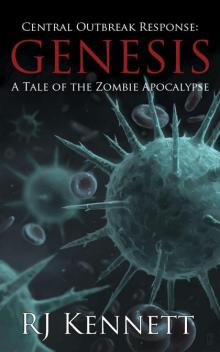 Genesis
Genesis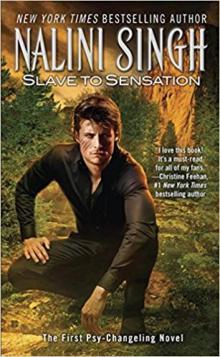 A Slave is a Slave
A Slave is a Slave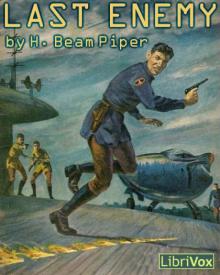 Last Enemy
Last Enemy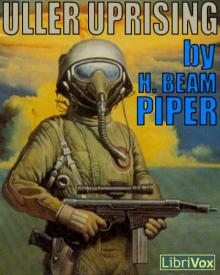 Uller Uprising
Uller Uprising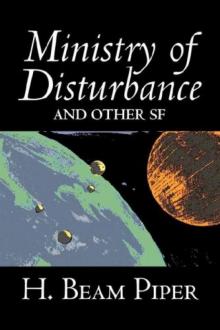 Ministry of Disturbance
Ministry of Disturbance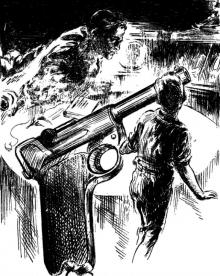 Time and Time Again
Time and Time Again The Mercenaries
The Mercenaries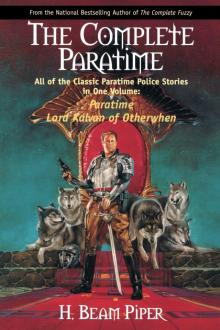 Police Operation
Police Operation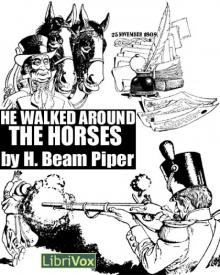 He Walked Around the Horses
He Walked Around the Horses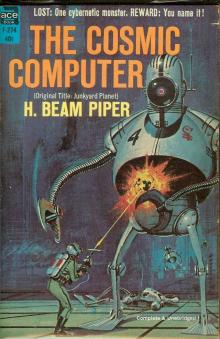 Time Crime
Time Crime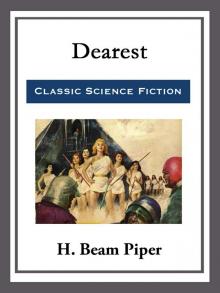 Dearest
Dearest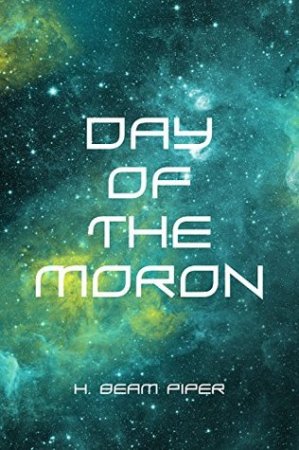 Day of the Moron
Day of the Moron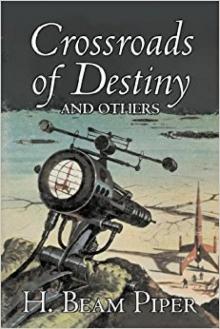 Crossroads of Destiny
Crossroads of Destiny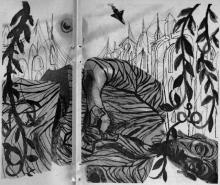 Graveyard of Dreams
Graveyard of Dreams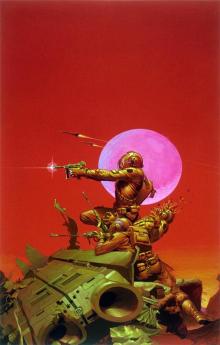 The Cosmic Computer
The Cosmic Computer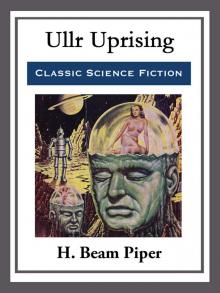 Ullr Uprising
Ullr Uprising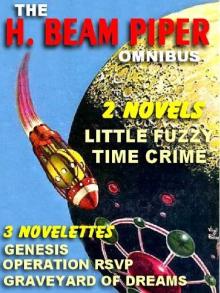 Operation R.S.V.P.
Operation R.S.V.P.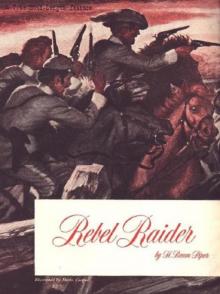 Rebel Raider
Rebel Raider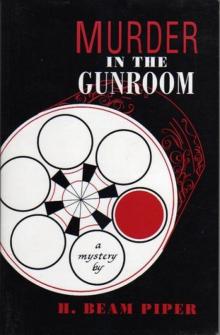 Murder in the Gunroom
Murder in the Gunroom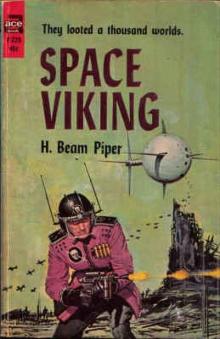 Space Viking
Space Viking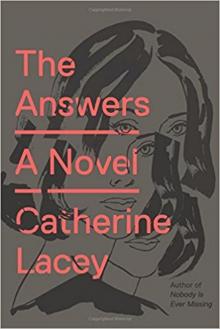 The Answer
The Answer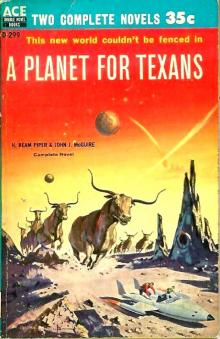 A Planet for Texans (aka Lone Star Planet)
A Planet for Texans (aka Lone Star Planet)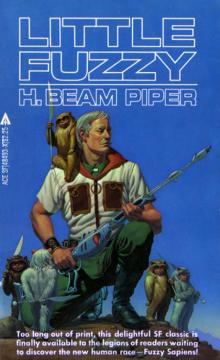 Little Fuzzy
Little Fuzzy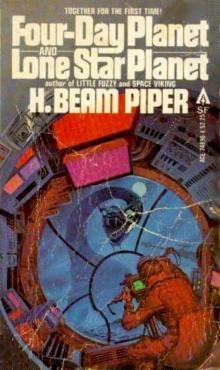 Four-Day Planet
Four-Day Planet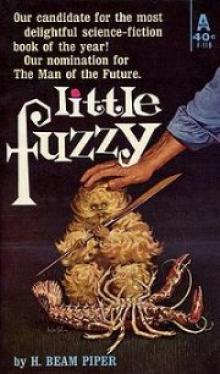 Little Fuzzy f-1
Little Fuzzy f-1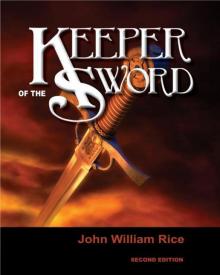 Keeper
Keeper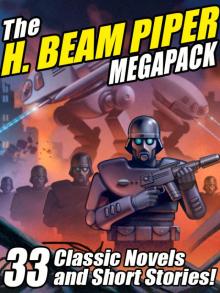 The H. Beam Piper Megapack
The H. Beam Piper Megapack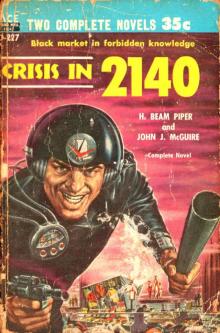 H. Beam Piper
H. Beam Piper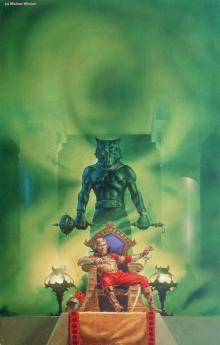 Lord Kalvan of Otherwhen
Lord Kalvan of Otherwhen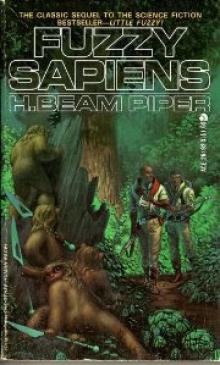 Fuzzy Sapiens f-2
Fuzzy Sapiens f-2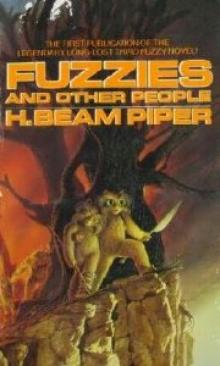 Fuzzies and Other People f-3
Fuzzies and Other People f-3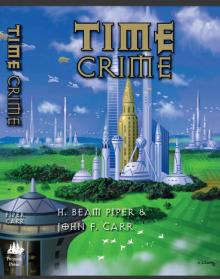 TIME PRIME
TIME PRIME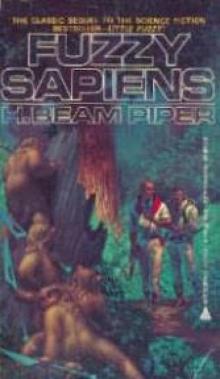 Fuzzy Sapiens
Fuzzy Sapiens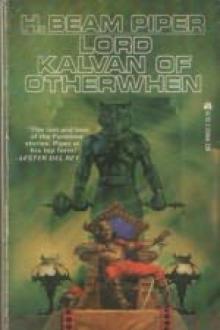 Lord Kalvan of Otherwhen k-1
Lord Kalvan of Otherwhen k-1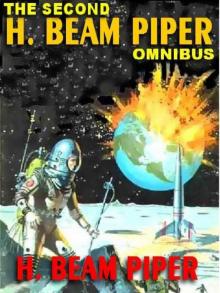 The Second H. Beam Piper Omnibus
The Second H. Beam Piper Omnibus